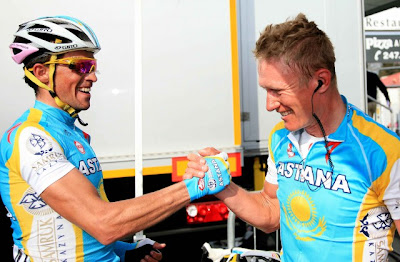London’s The Independent has an interesting idea today, namely that corporate sponsors are taking out insurance policies to protect themselves against sponsorship deal going sour.
Big brands associate with sports champions for obvious reasons but all too often the brands link up with an idealised vision of of the champion, an almost mythical status. Whereas the actual individual or team involved is prone to the usual human mistakes.
 |
| Contador and Vino shake hands on a pact to damage the image of Kazakhstan |
So when Tiger Woods goes on the rampage or a cycling team collapses in disgrace, the corporate backer can get a pay out from the insurer to compensate them.
A spokesman for Lloyds said the cost of the policy depends on the worth of the deal and the image of the celebrity. Premiums generally vary between half and one per cent of the sum insured, up to £10,000 per £1m. “If someone is squeaky clean and seems unlikely to cause a scandal – such as [tennis player] Roger Federer, then the premium would be quite low,” he said.
Given the statistical evidence, I suggest the rate could be higher for backing a pro cyclist although I suspect the likes of Astana don’t subscribe to these policies. I wonder if RadioShack have insurance against the prospect of Lance Armstrong getting sucked into the vortex?
More interesting for me is the idea of this insurance. Because for me we can insurance against some freak events but a sportsman going on the slide is something that can be worked at. For example Garmin’s involvement in cycling seems to be a good two-way process, with the sponsor funding extra anti-doping controls and taking the whole team towards an ideal of cleaner sport. In other words a company that takes out insurance might be prudent but it also means they view the investment as neutral, that in the event of something going wrong they can walk away with a tidy insurance payout.

Surely the best insurance is to back a sport with less chance of worry or scandal?
If a sponsor got involved with a team or individual that became embroiled in a scandal it would probably end up in a win win situation for them. Their name would be all over the media and at the same time they put in a claim to get their sponsorship money back.
If it came down to insurance, Radio Shack just made sure they would be denied due to negligence. They have a new commercial spot featuring Lance for the holiday shopping season.
Anonymous: yes, that explains why cycling doesn't attract the same big name sponsors we see in soccer, tennis, Formula 1 or rugby.
Gavin: the name would be in the media but not a in controlled way. Companies tend to hate this kind of risk.
Champs: I think the RadioShack deal was more about linking with Armstrong than actually funding a cycling team. After all there are no Radioshack stores in Europe and few bike races get meaningful TV coverage in the US.
the media exposure of the higher profile sports, in combination with a more efficient press control – and associated national sport bodies, would i suggest, ensure that the negativity of situations as encountered by professional cycling, would generally never see the light of day.
Equally, Cycling is still perceived in some quarters as a lower class sport.
e.g. Rugby attracts the public school brands, ie Investec and the associated corporate beer gut entertainment.
Having encountered the head of the Belgian Lotto and Mr Omega Pharma stood at the side of the road, with cans of coke, and a snag wrapped in a slice of sauce soaked bread, professional cycling in some areas, still has a lot to learn….
Thought you might like this:
http://cyclocosm.spreadshirt.com/pistolero-steakhouse-A6703429/